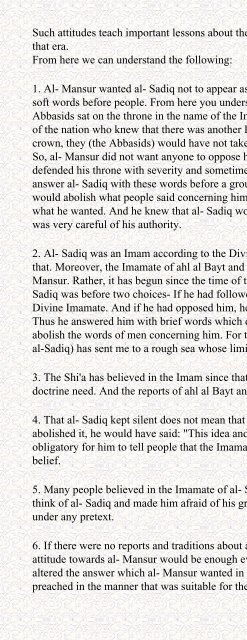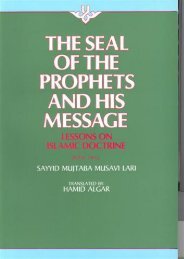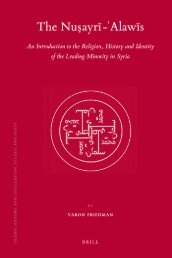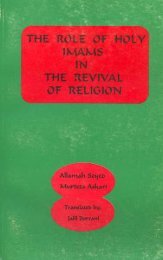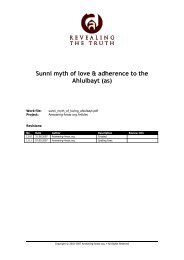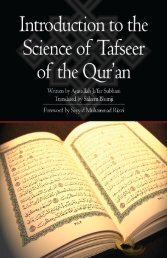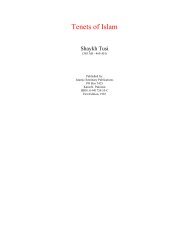Imam Al-Sadiq
Imam al-Sadiq - UMAA | Library
Imam al-Sadiq - UMAA | Library
- No tags were found...
You also want an ePaper? Increase the reach of your titles
YUMPU automatically turns print PDFs into web optimized ePapers that Google loves.
Such attitudes teach important lessons about the policy, knowledge, and faith of the people of<br />
that era.<br />
From here we can understand the following:<br />
1. <strong>Al</strong>- Mansur wanted al- <strong>Sadiq</strong> not to appear as an <strong>Imam</strong>. So, he tried to cheat him with these<br />
soft words before people. From here you understand the cleverness of al- Mansur, because the<br />
Abbasids sat on the throne in the name of the <strong>Imam</strong>ate and caliphate. If there had been a part<br />
of the nation who knew that there was another <strong>Imam</strong> who was the owner of the pulpit and the<br />
crown, they (the Abbasids) would have not taken the reins of authority.<br />
So, al- Mansur did not want anyone to oppose his authority. In other words he sometimes<br />
defended his throne with severity and sometimes with lenity. So, it was a part of his policy to<br />
answer al- <strong>Sadiq</strong> with these words before a group of people. <strong>Al</strong>so he thought that al- <strong>Sadiq</strong><br />
would abolish what people said concerning him, then through this he would be able to get<br />
what he wanted. And he knew that al- <strong>Sadiq</strong> would not answer him, because he (al- <strong>Sadiq</strong>)<br />
was very careful of his authority.<br />
2. <strong>Al</strong>- <strong>Sadiq</strong> was an <strong>Imam</strong> according to the Divine nomination. He and the Shi'a believed in<br />
that. Moreover, the <strong>Imam</strong>ate of ahl al Bayt and of al-<strong>Sadiq</strong> was not born during the era of al-<br />
Mansur. Rather, it has begun since the time of the Owner of the mission. For this reason, al-<br />
<strong>Sadiq</strong> was before two choices- If he had followed al- Mansur, he would have abolished the<br />
Divine <strong>Imam</strong>ate. And if he had opposed him, he would have subjected himself to his evil acts.<br />
Thus he answered him with brief words which did not declare his <strong>Imam</strong>ate, nor could they<br />
abolish the words of men concerning him. For this reason, al- Mansur said: "Indeed this (i.e.<br />
al-<strong>Sadiq</strong>) has sent me to a rough sea whose limit cannot be reached...."<br />
3. The Shi'a has believed in the <strong>Imam</strong> since that day. This is what the fundamentals of their<br />
doctrine need. And the reports of ahl al Bayt and their traditions have denoted that.<br />
4. That al- <strong>Sadiq</strong> kept silent does not mean that he abolished the <strong>Imam</strong>ate. And if he had<br />
abolished it, he would have said: "This idea and belief is abolished." Moreover, it was<br />
obligatory for him to tell people that the <strong>Imam</strong>ate was abolished and prevent them from this<br />
belief.<br />
5. Many people believed in the <strong>Imam</strong>ate of al- <strong>Sadiq</strong>, peace be on him. This made al- Mansur<br />
think of al- <strong>Sadiq</strong> and made him afraid of his great position. So, he tried to get rid of him<br />
under any pretext.<br />
6. If there were no reports and traditions about al- <strong>Sadiq</strong>'s great position, his words and<br />
attitude towards al- Mansur would be enough evidence for his great position. For example, he<br />
altered the answer which al- Mansur wanted in the manner that bewildered him. Then he<br />
preached in the manner that was suitable for the position of kings and their many tribulations.


